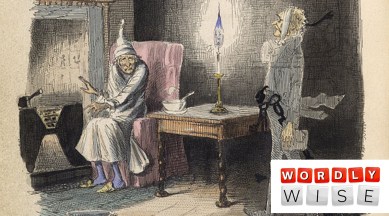Charles Dickens’ A Christmas Carol: Read it to discover a treasure trove of words
Charles Dickens, the prolific and acclaimed 19th-century author, was a master wordsmith. On the eve of Christmas, let’s delve into one of his most popular works.

It’s time for a Christmas carol. So, here’s one you can read or sing aloud.
Charles Dickens, one of the most prolific and acclaimed authors of the 19th century, was a master wordsmith. Someone who wrote for the masses, he brought to life many words which had fallen into disuse. He also used existing vocabulary in a way that added new connotations to words.
A Christmas Carol, one of his most popular books, is a treasure trove of words. Some have gone out of currency while a large number of them remain in usage. On the eve of Christmas, let’s delve into it to learn a few words.
But first an interesting point: Dickens divided the book into five chapters that he called staves. Stave is a musical term. A stave is the five lines that music is written on. This was the author’s way of reminding us that this is a Christmas story. Just as there are five lines in the musical stave, there are five movements that his story goes through. This was also meant to be read aloud just as carols are sung aloud.
The book revolves around a rich but mean and selfish old man named Ebenezer Scrooge who hates people and hates Christmas celebrations. It is about how he encounters ghosts, on the eve of Christmas, who take him on a journey of past, present and future making him a reformed man. His name is now part of the English vocabulary. Scrooge, as a noun, means someone who is stingy with money.
The author used ‘bah humbug’ as the catchphrase of the protagonist. The word humbug, implying a sense of deceit and annoyance, was already in use by the time Dickens was writing his book. He added ‘bah’ to it as an expression of exclamation which Scrooge uses frequently to show his annoyance with Christmas celebrations. Today, the expression ‘bah humbug’ is used to express displeasure about an occasion that others enjoy. “Bah humbug! Festivals have become an excuse for extravagant shopping sprees”. Sometimes it is also used as a verb to mean ‘to pour cold water’ on something. “We had a great office picnic plan on Christmas but our boss bah humbugged it.”
Scrooge is shown as a misanthropist. Its adjective is misanthropic which is used to describe a person who has a general dislike for others and avoids people. It is derived from Greek words ‘anthropos’ for ‘human’ and ‘misein’ for ‘to hate’. He spent his childhood with his misanthropic uncle and so could not make many friends.
Supplication, not in frequent use, is a form of prayer in Bible, a call for help from God. Though a noun, it comes from Latin verb ‘supplicate’, meaning ‘to plead humbly’. In modern usage, it means asking something from someone in position of power in a humble way. His supplication before his boss to let him stay in his position fell on deaf ears.
Another word used in the book with similar meaning is entreaty. Despite his entreaties (the plural form), his superiors transferred him to a city far away from his home.
You could add a wonderful array (a range of a type of thing) of words like waggish (playful or mischievous humour); despoil (another word for pillage, which means to strip or deprive violently, plunder); morose (a bleak attitude or outlook); avarice (extreme desire for wealth); opaque (not transparent, something that is unclear); capacious (having a lot of space, roomy); heresy (a belief that goes against the teachings of the Christian church, so by extension any religious belief that is at variance with the accepted norm) among a bevy of others.
Now you know Dickens was no scrooge with words. So, if you want to be smart with your words, start with A Christmas Carol.
Happy reading and Merry Christmas!